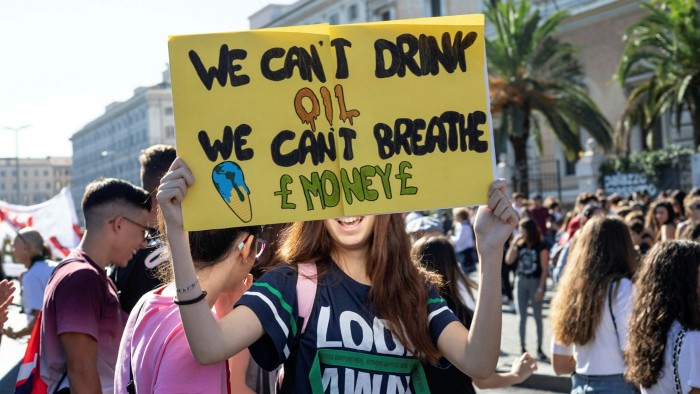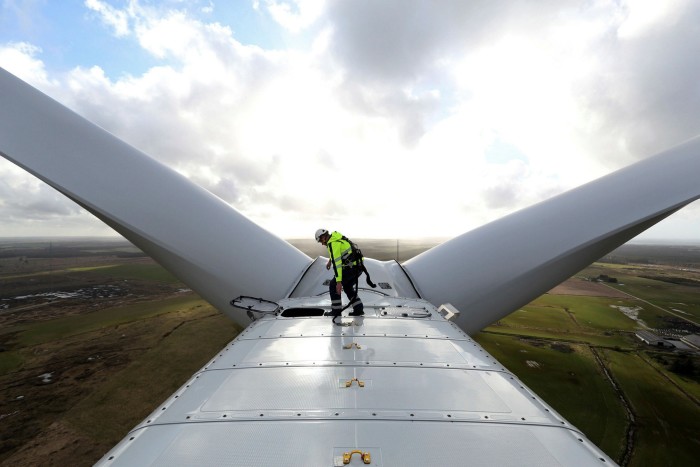Investors pull green levers to reshape energy sector


Simply sign up to the Renewable energy myFT Digest -- delivered directly to your inbox.
Investing in energy is not what it was. Oil and gas companies like BP and Royal Dutch Shell were traditionally reliable dividend payers, the stalwart of any respectable income investor’s portfolio.
The coronavirus pandemic has thrown that status into doubt. In April, Shell cut its dividend for the first time since 1945 as the oil price slumped, while some analysts have predicted BP could cut its dividend as early as next month as it struggles with the slowdown in economic activity this year.
But the pandemic and its shock economic consequences are not the only threat to traditional energy stocks. Greater regulation aimed at reducing carbon emissions is also making more investors wary of investing in oil and gas companies. Across the world, pension funds, universities and cities have been divesting their portfolios of energy and other stocks deemed to be harmful to the environment — traditionally coal companies and the oil and gas majors.
Whether divestment is the right step for environmentally minded investors is debated. Some argue that divestment does not harm oil companies as other less scrupulous investors are always willing to buy the shares when they are cheaper.
The alternative to divesting is shareholder engagement: institutional investors are becoming more proactive when it comes to voting on climate change resolutions at companies’ general meetings and pushing them to become greener.
Small shareholder groups like ShareAction in the UK and As You Sow in the US also run campaigns encouraging retail investors to band together to put resolutions on the table at big companies — larger institutional investors sometimes join these resolutions, too.
Others argue that divestment is as much a sound investment decision as a moral consideration. They predict that traditional energy companies will return less and be riskier investments in a future where the onus is on transitioning to cleaner forms of energy.
As a result, many investors are looking for opportunities in the clean energy space: stocks that will enable them to benefit from the energy transition — and possibly even with a clean conscience.
There are all sorts of companies aiding the transition, from large listed companies to small start-ups, meaning there are options for most investors with different risk profiles.
New technologies, like better electric batteries for cars, or better ways of capturing and storing carbon, need to be developed, while established technologies like wind and solar need to scale up further.

Existing energy companies — that need to transition to renewable sources to survive — will need to either develop their own technologies or snap up innovative new companies. This can open up opportunities for investors in the private equity space.
Guido Moret, head of sustainability integration credits at asset management group Robeco, says: “The key will be identifying those companies that, by rethinking their investment plans and business models over the longer term, can offset the challenges — declining cost of clean energy technologies, growing regulatory momentum to limit greenhouse gas emissions — and weather long-term volatility through the economic cycles. These businesses will be better positioned in a lower-carbon future.”
There are less obvious ways of investing in the energy transition than buying renewable energy companies. Infrastructure for electric vehicles needs a huge amount of development, and companies offering charging points can also be good options. One such example is Liberty Global, which has struck a deal to build a UK network of electric vehicle charging points in residential streets using the underground duct network of its telecom business.
Various investment houses are now offering mutual funds that specialise in clean energy or the energy transition. Schroders last year launched a Global Energy Transition fund that it said would aim to capture the “vast” opportunity in this area.
Pictet has a long-established Clean Energy Fund that invests in Spanish utility company Iberdrola, US clean energy company NextEra Energy and NXP Semiconductors, which uses semiconductor technology to make various industrial processes and transportation more efficient.
Investors should also think about the types of asset class they are picking if they want to achieve change. Buying and selling equities is sometimes compared with shuffling deckchairs on the Titanic when it comes to trying to effect change at traditional energy companies which, some say, are unlikely to profoundly unravel their commitment to hydrocarbon production.
Some investors believe bonds are a more effective tool at listed companies, as they are often issued to supply finance for more specific purposes. Buying into companies at the private equity or venture capital stage can also give investors with a higher risk appetite the potential for better returns, as well as a greater say in how the company develops.
“Investors’ ability to accelerate real-world change differs by asset class,” says Murray Birt, senior ESG strategist at asset manager DWS. Simply buying shares in green companies does nothing to actually lower the global carbon footprint, he says.
“The largest clean energy investment needs are in developing countries, so to truly change the world, more investors need to consider emerging market private equity and debt funds.”
The writer is the editor of Trade Secrets. Her book, Investing to Save the Planet, will be published by Penguin in November 2020.

Comments